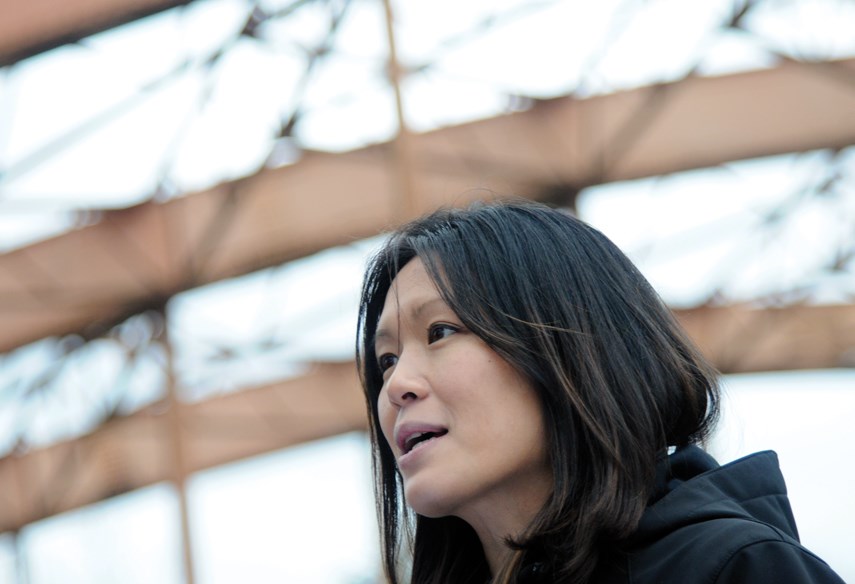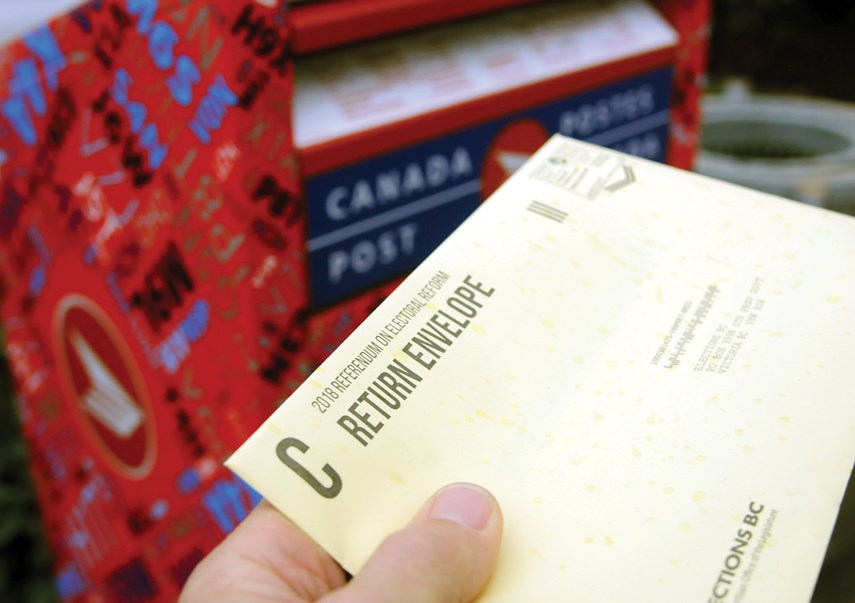North Shore referendum results reflected ballot counts on electoral reform across the province with the majority of voters in North and West Vancouver opting to stick with the existing first-past-the-post system of voting.
Proportional representation went down to defeat in B.C.’s mail-in referendum, with 61.3 per cent of voters rejecting that option in favour of keeping the status quo.
Of 3,297,395 registered voters, 1,430,358 voted – said Chief Electoral Officer Anton Boegman – for voter turnout of approximately 43 per cent provincewide.
Voters in all four North Shore ridings rejected a switch to proportional representation – some more decisively than others.
West Vancouver-Capilano voters came out strongest in favour of keeping first past the post, with 71 per cent of those who voted casting ballots in favour of the current system, compared to 29 per cent who favoured proportional representation.
North Vancouver-Seymour also roundly rejected pro rep, with 60 per cent of voters favouring FPTP compared to 40 per cent of votes cast for pro rep.
In North Vancouver-Lonsdale – the only seat held by the NDP – the majority of those who voted – 56 per cent – still came out in favour of first past the post.
The riding with the closest result on the North Shore was West Vancouver-Sea to Sky, where voters still favoured the existing system, but by a much narrower margin – 51.5 per cent – compared to 48.5 per cent of voters who favoured pro rep.
West Vancouver-Capilano Liberal MLA Ralph Sultan said he was pleasantly surprised by the results. “Frankly, I thought it would be much closer,” he said. “It’s what I would call a decisive win.”
Sultan, who opposed a switch to proportional representation, and campaigned in favour of FPTP in his riding, called the referendum questions “muddled” and “confusing.”
“I think the government and (Attorney General David) Eby were trying to be too clever by half,” he said.
Sultan predicted Green Party Leader Andrew Weaver will likely be reconsidering whether the strategy of “being in bed with the NDP is paying off for him.”
Bowinn Ma, NDP MLA for North Vancouver-Lonsdale, who campaigned in favour of proportional representation, said she was personally disappointed in the result but “I accept that didn’t turn out to be the majority position, she said. “You take the results whether you personally agree with them or not. The people have spoken.”

Ma said she wasn’t sure why pro rep was rejected. “It’s common for people to have a fear of the unknown,” she said. “Proportional representation doesn’t exist here in Canada yet.”
But Ma said she doubts the rejection of pro rep will change the relationship between the NDP and the Greens in the legislature. “I think our agreement with the Greens is solid,” she said.
Weaver released a statement Thursday afternoon that said, “While we are disappointed with this result, we respect British Columbians’ decision to retain the current first-past-the-post system.”
West Vancouver Sea-to-Sky Liberal MLA Jordan Sturdy welcomed the results.
“I was surprised frankly at how strong or how definitive it was, overall, provincially,”he said,
The closer results in his own riding are reflective of the results in the past referenda in 2005 and 2009. Sturdy said he suspects the Squamish and Whistler portions of the riding were likely keener on PR, based on their younger demographics. To those constituents disappointed with the result, Sturdy said his door remains open.
“There are always improvements that can be made in any electoral system. Nothing is perfect but we have a system that has served us well. If they don’t feel represented, my job is to try and help them feel represented,”he said. “We certainly don’t ask people who they voted for when they walk in our office. We always try to represent the interests of the constituents.”
As for the future of electoral reform in B.C., Sturdy didn’t want to make any predictions.
“I’ve been in this game long enough to never say never, ever. That’s just not the way things work. But we’ve done three now in 15 years. I don’t think there’s an appetite to carry on at this point,”he said. “It was $15 million as well, plus time and energy. I wander what the total human capital cost of this was?”he added with a laugh.North Vancouver-Seymour Liberal MLA Jane Thornthwaite said she was “very, very pleased” and a bit surprised when the results were announced.
“The pollsters had said that it was going to be close so I think this is a decisive victory. It’s probably better than any of the first-past-the-post advocates were expecting,” she said.
While she is celebrating the win, Thornthwaite said there were problems throughout the referendum that would inspired little faith in the results.
“I don’t think that this entire process was legitimate. I’m happy with the result but the referendum was politicized,” she said.
Thornthwaite attributed the low turnout to people being preoccupied with more important issues.
Now Thornthwaite said all eyes will be on the Nanaimo byelection, which could result in another power struggle in the legislature if the BC Liberals win.
“(The NDP) is only one vote ahead of us and they must be worried,” she said. “We’ve got a session to go through in February and they’ve got to get their budget approved.”
Thornthwaite noted even the three ridings currently held by the Green Party only supported proportional representation by narrow margins.
“I think (the Greens) going to be licking their wounds a little bit and going ‘what went wrong.” Maybe they don’t have as much support as they think they do,” she said
Results varied considerably between ridings throughout the province, with some areas like Peace River North voting more than 86 per cent in favour of keeping first past the post while Vancouver-Mount Pleasant voted 74 per cent in favour of switching to electoral reform.
The majority of voters in all but 16 ridings voted to keep the current system.



